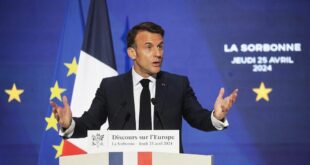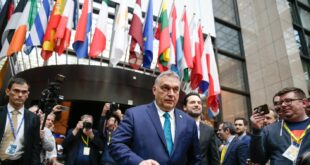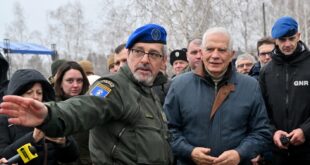The lack of serious analysis of great power competition within Russia is due in large part to the baggage that Russian officials bring to any discussion of the country’s place in the post–Cold War world. All too often, debate in both policy and analytical circles is guided by long-standing grievances, as well as a fixation on the United States as an existential threat to the survival of Russian President Vladimir Putin’s regime. As a result, the Kremlin’s chronic insecurity and inferiority complexes are never far from the surface, drowning out meaningful discussion of rapidly unfolding global economic, political, and technological shifts.
Stuck in Reactive Mode
The quality of the Kremlin’s strategic thinking is hampered by numerous blind spots. Strategic hostility toward and fear of the West often lead to impulsive behavior like the 2014 annexation of Crimea. Since China is not a threat to the current regime, there is little incentive to think through the implications of its expanded global role. Notwithstanding a Western predilection for portraying the Kremlin as a bastion of deep strategic thinkers, such short-termism is nothing new. As former national security adviser Zbigniew Brzezinski wrote nearly four decades ago, “It is quite doubtful that the Soviet leaders operate on the basis of some broad revolutionary blueprint or that they even have a systematic long-term strategy. . . . [They] operate in the context of an orientation in which the retention of what Moscow controls and the disruption of what Washington seeks to organize provide lodestars for more specific tactics and strategies.” The same could be said about Putin today.
The contrast with the Western discussion about the challenges to the fraying rules-based international order could not be more striking. There is no Russian equivalent to the discussion that is being held in the United States, where Secretary of State Antony Blinken openly portrays China as “the only country with the economic, diplomatic, military, and technological power to seriously challenge the stable and open international system — all the rules, values, and relationships that make the world work the way we want it to.”
What’s the Plan on China?
For Moscow, the budding partnership with Beijing is something else entirely. It provides feel-good opportunities to jab a finger in America’s eye. To members of the Russian elite, China is the place to be for marketing hydrocarbons, raw materials, and defense technologies. But where is the soul-searching about whether Putin’s frantic embrace of China after 2014 was propelled by wishful thinking? Is there a Kremlin plan for staying relevant for China after its upcoming transition to a low-carbon future or managing Beijing’s growing footprint in the former Soviet space? Your guess is as good as ours.
What one sees instead are traces of the single most formative experience for Putin’s generation: the demise of the Soviet Union and the domestic political chaos, economic meltdown, and collapse of Russian influence in both the so-called “near” and “far” abroad that it unleashed. Grievances from that era linger, and Putin and his supporters remain fixated on making sure that never happens again by shoring up the power of the state, which they equate with their regime. The Russian catchall terms that have commonly been applied to Putin and such thinkers for the past two decades—derzhavnik (a great power nationalist) and gosudarstvennik (a proponent of a strong state)—continue to animate the Kremlin’s focus on buttressing the regime’s centrality at home while seeking to undermine the West.
Why the Kremlin Thinks the Way It Does
The statist mentality of the Putin regime has deep roots in Russian historical experience, including the fall of the Romanov dynasty in 1917 and other periods of great turmoil that followed a weakening of Russia’s central government. A series of major setbacks in the 1990s and early 2000s—specifically, U.S.-led military action in the Balkans, the war in Chechnya, and the Orange Revolution in Ukraine—crystallized several things for the Russian leadership. First and foremost, it convinced them that what really mattered was the preservation of Putin’s increasingly personalistic regime, the modernization of Russia’s hard power capabilities, and the protection of buffer zones and its strategic position in the post-Soviet space. For centuries, Russian strategic culture has seen the European theater as the source of the greatest threats to the state regime, be it Napoleon in 1812, Hitler in 1941, or the United States, NATO, and the EU during and after the Cold War. In this context, it is hardly surprising that the Kremlin’s strategic goals in the early 1990s—joining the West, building democratic institutions, or embracing the rule of law—have been viewed by Putin and his cohort as quaint niceties in a world where, as he put it, “We showed ourselves to be weak, and the weak get beaten.”
It is this framework that provides the overarching basis for all thinking on the global environment, including great power competition, that is acceptable to the regime. Since the 2008 Great Recession, Russian leaders have chosen to comfort themselves with the notion that America is in inexorable decline and that a multipolar world is now within the Kremlin’s grasp. This desire to spur the emergence of a non-U.S.-led world remains central to how Putin and other Russian leaders talk about their strategic priorities and their diagnosis of the sources of the most acute problems between Russia and the West. There is far less analysis in Russia about how the broader international system is shifting, the impact of China’s rise on longer-term Russian interests, or how to fortify Russia’s economy and geopolitical clout amid shifting energy markets. The world is changing fast, but thus far there is limited discussion of the impacts of that change, unlike in the United States, Europe, China, or other parts of Asia.
In the Kremlin’s telling, it is precisely the U.S. unwillingness to give up its ability to dictate to other powers or to abide by the principles of international law that causes much of the tension in the international system. A March 2021 Sino-Russian joint statement released on the heels of the contentious high-profile meeting in Alaska between senior U.S. and Chinese representatives is a good case in point. The United States needs to “reflect on the damage it has done to global peace and development in recent years, halt unilateral bullying, stop meddling in other countries’ domestic affairs, and stop forming small circles to seek bloc confrontation.”
Russia Wants Everyone to Mind Their Own Business
It just so happens that Russian leaders have a ready-made solution to this problem—the international system should be governed by a select grouping of great powers. Working under the aegis of the UN Security Council (UNSC), these states should negotiate the rules by which all countries would live by. Central to this vision is the principle of non-interference in each other’s—read: Russia’s—internal affairs and respect for designated spheres of influence. Despite professing undying support for the principles of international law, the Kremlin does little to disguise its overriding goal: ensuring that the United States cannot launch military action without Moscow’s consent enforced by its veto in the UNSC.
These ideas, however self-serving, have been omnipresent in the rhetoric of Russian officialdom for years. They also animate the Kremlin’s main foreign policy initiative over the past eighteen months: a pointless call for a summit-level meeting of the five UNSC permanent members (the United States, UK, France, Russia, and China). The fact that Putin puts his own imprimatur on such hazy symbolic initiatives says a lot about the state of contemporary Russian foreign policy thinking and the inability to build new coalitions of like-minded states—let alone to engage seriously on formulating viable rules of the road for a more complicated global environment. Russia’s discussion of international competition appears stuck on the United States, which is just one of the challenges that modern Russia faces today. Those challenges include economic distress, rising discontent at home and an assertive China in Russia’s own backyard. But such a narrow focus on the West, combined with Russia’s preference for symbolism over substance, continues to blind Russian thinkers to opportunities to adapt to today’s far messier world.
 Eurasia Press & News
Eurasia Press & News



